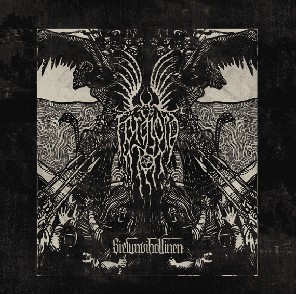Bubonic Productions, perhaps most commonly known for being a true fountain of acts in the field of rawest and most disgusting black metal
possible (think of Vetala, Mons Veneris and the likes from the sublabel Discipline), does not dwell merely on the borders of noise and black metal: Sentimen
Beltza's take on the genre hails to the shores of Finland, most
clearly to the melancholic and organic sound of Sargeist. Come to
think of it, I have probably never before witnessed a band this close
to the style of the aforementioned band, and while it does gets
thumbs up from me, the imitation also becomes Bizitza Osoan Zehar
Sortu Den Etsipenaren Ondorioak's main downside.
From the very first seconds into the
”Hosto Eroriak”, the deal becomes quite evident: over the
steadily battering mid-paced blast beats are being fired tremolo full
sorrowful riffs. The overall atmosphere is really gloomy and
hopeless, yet there is always a slight sense of something ominous in
the air. The wintery landscape on the album's cover is pretty
fitting, although my thoughts wander to somewhat darker, nocturnal
territories than what the picture conveys while listening to the
record. The songs are deliberately repetitive in the riff department,
which also reflects in the song lengths varying from seven to
thirteen minutes. While we consider the rather, erm, stagnant style
in which Sentimen Beltza deliberately executes its black metal comprised of
familiar ideas, eventually the album starts to drag on a bit, and the
blossoming sadness sees no end, not even momentary, until the fifth
track "Etsipenaren Ondorioak (Itxaropenik Gabe Part III)" that
introduces a power chord section that lasts for a few seconds. This
is the kind of variation I would have liked to hear a bit more during
the course of over 50 minutes.
Musically, the album is very solidly
performed. The drumming and guitar work is flawless, making the songs
run smoothly. The only problem I see resides in the vocals that,
while fittingly raspy, have a distortion effect on them which always
evokes a somewhat bedroomish feeling. Sentimen Beltza is certainly no
cheap bedroom project anyhow, considering the authenticity in the
instrumental departments, but it's the vocals that have something to
improve upon. Albeit I've criticized a lot of the album's elements,
as a whole the record stands above many, and if one is not tired of
bands akin to Sargeist and the fellows, Bizitza Osoan Zehar Sortu
Den Etsipenaren Ondorioak is more than an apt object of exploration.
3.5 / 5







